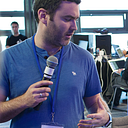The Engineer* of the (Near)Future
*maybe they’re not called engineers anymore
I’ve been an engineer for about 18 years, and for most of that I’ve been of the opinion that engineers need to be more than just coders in a corner, that for their benefit, and the benefit of their projects and companies they need to do more, to understand more, to be part of the problem definition as well as the solution — to ask why & what along with how.
With the advent of GenAI however, I think this outlook has never been as important — and engineers should realise that the days of being good at just the engineering pieces are coming to an end.
GenAI lets us do more
If you’re not using GenAI in your work-life, you’re either doing something manual or you’re falling behind. I still code a fair bit and unless I already know what to do, I ask ChatGPT (or my company’s version, LibertyGPT) how to do it — no more Stackoverflow or Google needed.
But it’s a lot more than code — it can help you tackle most problems, even if you haven’t done that type of task before. How to structure an entire solution, how to design it so it looks nice, how to make a logo for the brand, how to write the content shown on screen, how to ideate on new features — it’s pretty much a tool you can ask about anything.
Of course, it’s not always amazing at everything, and frankly the friendly tone can grate after a while, but it’s a tool to be used, and it’s sitting there waiting to be.
Data Science Tasks
GenAI isn’t going to put Data Scientists out of a job, as there’s always room for very clever people who understand mathematics and modeling (and someone needs to build the LLMs!) but GenAI has democratized a lot of capabilities that previously required knowledge on how to train and build AI models.
A couple of years ago, a project with AI usually meant:
- Data scientists to train and test a model.
- Engineers to build a solution to deploy it.
- Maybe a data engineer to work on the data sourcing and storage etc.
- If done right, a designer to work on the problem definition, UX etc.
Now, if the problem is solvable with existing GenAI APIs, that could change to simply needing:
- Engineers to build a solution that uses the GenAI APIs.
Wait, what about the designers and data engineers?!
The data engineers basically are engineers anyway, and working with data and data storage mechanisms is a skill that “normal” engineers should get to grips with; especially as the hardest and most time consuming bit of most AI projects is obtaining and working with the data.
Not needing actual designers is a lot less certain. Professional design is 100% a skill, either natural or learned and currently I’d say it’s an alien one to most engineers. However — depending on what’s needed, a good set of guidelines … and a GenAI design assistant … with likely give you everything you need.
For example, let’s say we want to build a new enterprise solution to take in documents, do some GenAI summarization on them, and output the results to our users. We could:
- Use GenAI to create a design for us using a set of pre-existing enterprise guidelines (made originally by actual designers!), experimenting with the prompts involved to cater for any nuances of new features not catered for in the guidelines.
- Use GenAI to write the code for us (which we of course check for correctness!).
- Do all the awful but necessary data sourcing and manipulation tasks (using GenAI of course to help, as needed).
- Use GenAI to do the summarization tasks (bearing in mind we may also need other non-AI tasks like OCR, using other text or image recognition tools etc).
For something truly novel, we’d likely need real designers and/or data scientists but for a project like that, some well rounded engineers could get it done.
WAIT! Couldn’t … Designers use GenAI to do the engineering bits?!
Now we get to the interesting bit!
Who says we need “engineers” at all?
Maybe we need “GenAI Professionals” — or some other snappy title — who can use these new tools to do whatever is needed. Maybe these folks should be trained and educated in high-level data, design and engineering principals and then use GenAI to apply them — regardless of whether they saw or see themselves as “designers” or “engineers”.
Remember that the reason engineers, designers etc exist is to accomplish tasks e.g. building & maintaining solutions and products. It might seem far-fetched that these current highly rewarded jobs could change so much — but also remember that there used to be folks whose job it was to direct telephone calls,”Operator?”. Now my 14 year old daughter laughs when I call my mobile phone a “mobile phone”! She said to me the other day “it’s just called a phone”, because she’s never even seen one that wasn’t mobile!
Convenience always wins — as soon as there’s an easier way of doing something, that becomes the way of doing it.
The same applies to building products and solutions. If you owned a company, and you could hire 5 “GenAI Professionals” instead of 5 engineers, a data scientist and a designer, and they could do the exact same job with the same quality, what would you do?
So maybe the Engineer of the Future isn’t actually an “Engineer”!
